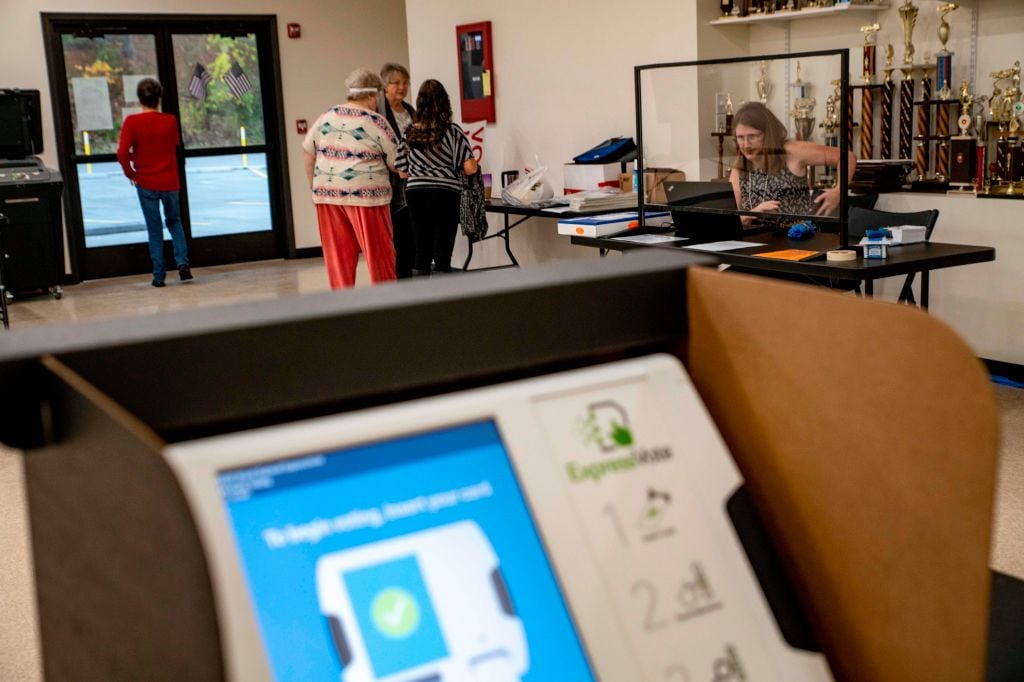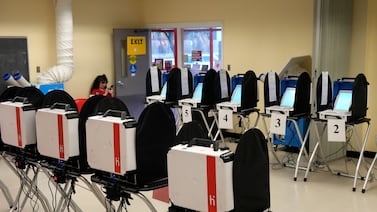Votebeat is a nonprofit news organization reporting on voting access and election administration across the U.S. A version of this post was originally distributed in Votebeat’s weekly newsletter.
“Election Denial Didn’t Play as Well as Republicans Hoped,” the New York Times headline announced on Nov. 9 last year, pointing out that candidates promoting election conspiracy theories in battleground states had largely lost their races. Other headlines ran along the same lines. “Election deniers overwhelmingly lost in battleground states” and “‘This movement was rejected’: Republican election deniers lose key state races.”
Those headlines are, of course, correct, and those candidates did indeed lose, suggesting the candidates’ support for election conspiracy theories didn’t win support from the general electorate.
But the recent decision by several Republican-led states to withdraw from a multistate coalition dedicated to cleaning and updating voter rolls shows how allegations of a tilted election playing field can still roil at least some voters. It’s clear that baseless allegations about the mechanics of elections are still circulating, and they’re powerful enough to shape events — and keep affecting our elections.
The Electronic Registration Information Center, or ERIC, was a previously obscure nonpartisan coalition created more than a decade ago to help states clean their voter rolls by sharing data across state lines. At Votebeat, we’ve written about it repeatedly, in no small part because it’s been the subject of baseless conspiracy theories and other misinformation for more than a year.
Those stories, and reporting in other outlets, have pointed out the lack of evidence behind allegations that ERIC is funded by liberal megadonor George Soros and it improperly shares data with progressive groups. But it’s also important to pause and think about what the decisions to withdraw by Louisiana, Alabama, West Virginia, Florida, Missouri, Ohio, and Iowa tell us.
Officials in those states cited a mix of data privacy concern and a failed push for changes to the group’s bylaws that, Ohio Secretary of State Frank LaRose said in the letter announcing Ohio’s withdrawal, would bolster confidence in ERIC and make it more bipartisan. Some Republicans, though, are among ERIC’s staunchest defenders. “Reacting to disinformation they’ve hurt their own state & others while undermining voter confidence,” tweeted Georgia Secretary of State Brad Raffensperger on March 7, throwing in an animated shot of children’s character Spongebob Squarepants punching himself in the face.
Some of the critics’ concerns and proposed changes are reasonable enough.
But it’s hard to miss that one reason for dwindling confidence in ERIC is a deliberate campaign to weaken it. And the people encouraging and celebrating states’ withdrawals have been those with histories of spreading inaccurate information about elections, including True the Vote, Audit the Vote PA, MyPillow CEO Mike Lindell, and former President Donald Trump, who inaccurately described ERIC as a system that ‘pumps the rolls’ for Democrats and does nothing to clean them up.”
So where does this leave us? Maybe with a sense that election conspiracy theories may not have the power to win statewide office for most candidates who promote them, but they do persist and do still have power. In the case of ERIC, they’re still coloring the debate — and still shaping events.
Back Then
ERIC wasn’t always so controversial.
The Obama Administration’s Presidential Commission on Election Administration endorsed the use of the program in its final report, released in 2014. And then, shortly after, the Republican National Lawyers Association also endorsed it. In a statement about the report, RNLA President Craig Burkhardt said, “PCEA suggests many good reforms for the election administration process. For example, its recommendations in areas such as voter registration and list maintenance would go a long way to reduce fraud and long lines in our election process. I’m glad the President’s former lawyer co-chaired the effort and helped author the PECA report – which document recognizes by inclusion that tasks such as list maintenance are not forms of voter suppression.”
In Other Voting News
The Arizona Supreme Court declined to hear GOP gubernatorial candidate Kari Lake’s challenge of her election loss, though it did order a lower court to review one count alleging that Maricopa County did not follow signature verification procedures, the Arizona Republic reported.
South Dakota Gov. Kristi Noem, a Republican, signed a dozen election bills into law, including a ban on absentee drop boxes and requirements for post-election audits and public tests of tabulation equipment within 10 days of an election, Kelo reported.
A group of plaintiffs including the NAACP sued Florida over a so-called “wet signature” requirement they allege creates a higher burden for voters of color, elderly, and low-income residents who may not have easy access to printers. The requirement bans digital signatures, and similar lawsuits are pending in Texas and Georgia, the New York Times reported.
Virginia Gov. Glenn Youngkin will no longer allow some residents convicted of felonies to automatically have their voting rights restored, reversing a practice put in place by previous governors. The change in practice has the potential to greatly reduce the number of people who regain the right to vote, the Washington Post reported.
The U.S. House Administration Committee will go ahead with a planned hearing on Luzerne County’s 2022 ballot paper shortage, even though county officials have said they will not attend, the Sunday Dispatch reports.
Carrie Levine is Votebeat’s story editor and is based in Washington, D.C. She edits and frequently writes Votebeat’s national newsletter. Contact Carrie at clevine@votebeat.org.







